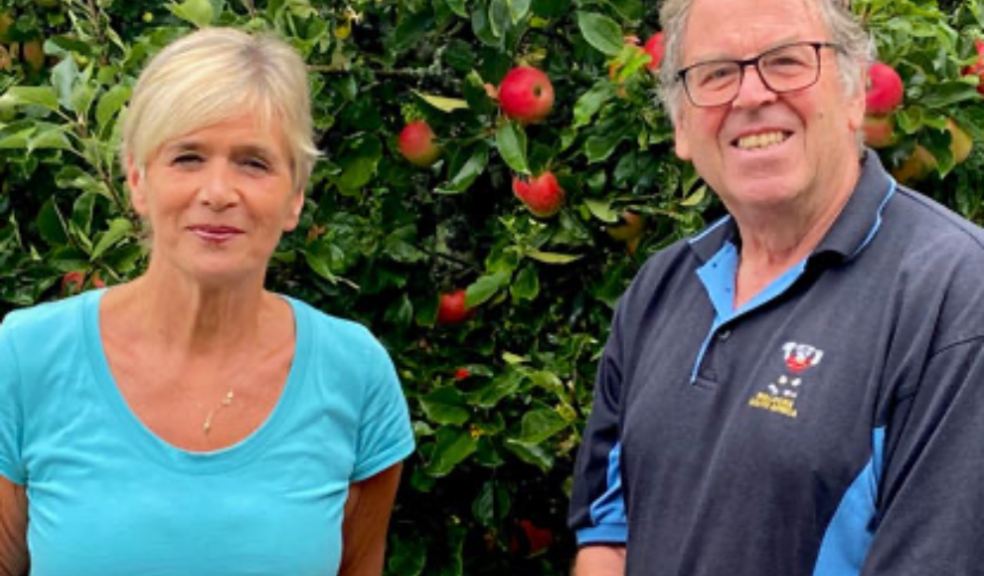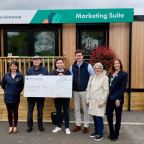
Therapeutic horticultural programme to aid cancer patients’ recovery
Cancer patients and those recovering from cancer treatment are now able to take part in a horticultural healing programme, being offered by the Mustard Tree Macmillan Cancer Support Centre at Derriford Hospital.
The community-based gardening therapy group, Blooming Well, is a new initiative for patients with a cancer diagnosis to promote wellbeing and aid their recovery. The Mustard Tree is providing the programme free of charge, including all equipment required, and refreshments are provided.
“The benefits of gardening are now well-established,” explains Annie Charles, project coordinator, pictured right with volunteer Nick. “It improves physical activity levels, lifts mood, boosts self-confidence, improves sense of wellbeing, helps re-focus attention when overwhelmed and decreases levels of stress and anxiety. However, there is very little evidence about the benefits to cancer patients, so this seemed a unique opportunity to find out more.”
After a successful pilot with a small group of patients, the programme is now available for others to apply to take part. It is held at Sheepstor village on the edge of Dartmoor and takes place over a six-week period as a two-hour session, either on a Wednesday morning or afternoon. Each course is tailored to the interests of all participants and a range of different gardening topics are discussed throughout.
“It’s a really lovely, healing space, and despite it’s rural location, it is very accessible,” adds Annie. “Patients haven’t been able to attend drop-in sessions at the Mustard Tree as they did before due to the pandemic, so this gives individuals a chance to meet and spend time with others who are going through something similar. Peer support can be very powerful.
“We welcome those new to gardening as well as those with more experience. Even if you have your own garden, you might feel overwhelmed on your own, and being with others can help. You’ll be immersed in nature and have the opportunity to learn more about things like how to encourage wildlife, sowing seeds, growing your own fruit and vegetables, and even creative recycling. We recognise that many may suffer with fatigue, so you can take part in activities at your own pace. We can’t predict the weather of course, but we spend as much time outside as possible. This programme can help to improve levels of physical activity too, as well as to reduce levels of stress and anxiety, which are all greatly beneficial.”
The programme has recently benefited from receiving a University of Plymouth Get Involved Award, which is designed to bring communities and researchers together to find sustainable solutions to local problems. Thanks to this funding, Annie, who already holds an RHS Diploma, has been able to undertake a Thrive course in Social and Therapeutic Horticulture; purchase required gardening equipment; install raised beds and provide subsidised transport to and from the venue for participants who do not have access to a car. Annie is now working with the University to conduct research gathering evidence on the potential benefits of therapeutic horticulture in aiding cancer recovery.
“I’m really excited to be collaborating on this research with Dr Alison Warren, Associate Professor of Occupational Therapy at the University and her team, who are, like me, interested in horticulture and its therapeutic qualities,” adds Annie. “We now have a unique opportunity to develop a specialist-led, volunteer assisted intervention programme which has the potential for national rollout. It could benefit a great number of patients.”
Chris, who recently took part in the course after total laryngectomy surgery, said: “I really enjoyed the course, and for me personally, it gave me a chance to connect with people, as my condition has massively reduced my outgoing and the way I interact socially. The venue was lovely, such a beautiful space, and a lovely group of people. It was certainly an enjoyable experience and improved my mental health throughout.”
Marjorie, another participant who is recovering from chemotherapy and radiotherapy, adds: “I have very dear memories of those few weeks. Being with like-minded people who are also experiencing similar health problems is really helpful. The garden is in the most calming place and to be able to plant seeds, take cuttings and be given plants to take home is really confidence boosting. My greenhouse would probably still be empty without the encouragement of Annie and Nick [a volunteer supporting the course] who gave me back enthusiasm and energy for my garden. I would recommend this project to all who have lost energy, weight and confidence through cancer treatment. It helped me to get my head around what the last year had thrown at me. Nature is a great calmer and healer.”
To find out more, please contact the Mustard Tree on 01752 430060.
You can also watch this video here: https://fb.watch/f8f1ERgg6U/













